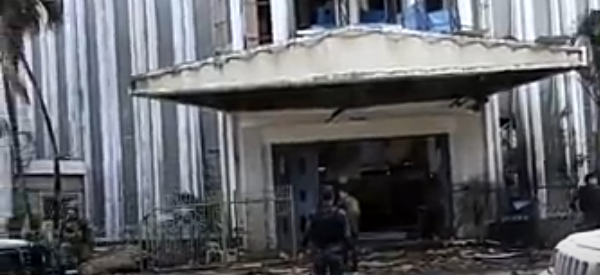Bomb Attack at Catholic Mass Claims Four, Injures Scores
No fewer than four people were killed and dozens wounded in a bomb attack on a Catholic mass in the insurgency-plagued southern Philippines on Sunday, with President Ferdinand Marcos blaming “foreign terrorists”.
The blast happened during a morning service at Mindanao State University’s gymnasium in Marawi, the country’s largest Muslim city, which was besieged by Islamist militant groups in 2017.
Police Lieutenant General Emmanuel Peralta said four people were killed and around 50 wounded in the blast from an improvised explosive device.
Other security officials said the bombing may have been a retaliatory attack for a series of military operations against Islamist militant groups in recent days.
Photos posted on the Lanao del Sur provincial government’s Facebook page showed several overturned plastic chairs, shattered glass, and debris around a black patch on the floor of the gymnasium.
University student Chris Jurado, 21, told AFP from his hospital bed that the explosion happened during the first Bible reading of the morning mass at 7:00 am (2300 GMT Saturday).
“It was sudden and everyone ran,” Jurado said.
“When I looked behind me people were lying on the floor. We didn’t know what happened because everything happened so fast.”
Rowena Mae Fernandez, 19, said she did not know what the blast was at first — then others started running.
“My companion and I also ran, even though we fell on the ground at one point. That was the only thing I remembered until I got out of the gym and I fell again,” she said from hospital.
“My friends were crying because they saw my injury.”
Marcos condemned the attack by “foreign terrorists”, describing it as “senseless” and “heinous”, while Pope Francis offered his prayers for the victims.
“I am close to the families, to the people of Mindanao, who have already suffered so much,” the pontiff said from his residence in remarks broadcast in Saint Peter’s Square.
Mindanao State University issued a statement condemning “the act of violence” as it suspended classes and deployed more security personnel on the campus.
“We stand in solidarity with our Christian community and all those affected by this tragedy,” the university said.
Marawi City Mayor Majul Gandamra urged members of the Muslim and Christian communities to remain united.
“Our city has long been a beacon of peaceful coexistence and harmony, and we will not allow such acts of violence to overshadow our collective commitment to peace and unity,” Gandamra said in a statement condemning the attack.
‘Cowardly acts’
Military chief General Romeo Brawner said the bombing may have been a revenge attack for military operations against three Islamist militant groups — Dawlah Islamiyah-Philippines, Abu Sayyaf, and Maute — in western Mindanao in recent days.
“That is one angle we are looking into,” Brawner told a news conference.
“Based on the evidence that we gathered there is a big percentage that points to the Maute-ISIS.”
Pro-Islamic State Maute and Abu Sayyaf militants — including foreign and local fighters — held Marawi under siege in 2017.
The Philippine military wrested back the ruined city after a five-month battle that claimed more than 1,000 lives.
“There are strong indications of a foreign element (in Sunday’s attack),” Defense Secretary Gilbert Teodoro told reporters.
Lanao del Sur and Maguindanao del Sur are part of the Bangsamoro Autonomous Region in Muslim Mindanao.
The country’s Muslim minority was given self-rule in Bangsamoro under former president Rodrigo Duterte as part of efforts to head off the lure of violent extremism.
Bangsamoro Government Chief Minister Ahod Ebrahim said he “condemned the atrocious and cowardly acts” and called for a “thorough investigation”.
Militant attacks on buses, Catholic churches, and public markets have been a feature of decades-long unrest in the region.
Manila signed a peace pact with the nation’s largest rebel group, the Moro Islamic Liberation Front, in 2014, ending their deadly armed rebellion.
But smaller bands of Muslim fighters opposed to the peace deal remain, including militants professing allegiance to the Islamic State group. Communist rebels also operate in the region.
AFP
